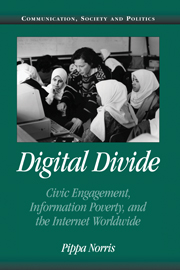Book contents
- Frontmatter
- Contents
- List of Tables
- List of Figures
- Preface
- PART I INTRODUCTORY FRAMEWORK
- PART II THE VIRTUAL POLITICAL SYSTEM
- 5 Theories of Digital Democracy
- 6 e-Governance
- 7 Online Parliaments
- 8 Virtual Parties
- 9 Civic Society
- PART III THE DEMOCRATIC DIVIDE
- Appendix A Nations in the Study and Abbreviated Names Used in Figures
- Notes
- Select Bibliography
- Index
8 - Virtual Parties
Published online by Cambridge University Press: 05 June 2012
- Frontmatter
- Contents
- List of Tables
- List of Figures
- Preface
- PART I INTRODUCTORY FRAMEWORK
- PART II THE VIRTUAL POLITICAL SYSTEM
- 5 Theories of Digital Democracy
- 6 e-Governance
- 7 Online Parliaments
- 8 Virtual Parties
- 9 Civic Society
- PART III THE DEMOCRATIC DIVIDE
- Appendix A Nations in the Study and Abbreviated Names Used in Figures
- Notes
- Select Bibliography
- Index
Summary
Parties have been adapting, by choice or necessity, to the new information and communication environment. More than 1,000 parties are now online, including over half of all major electoral parties, drawn from every political stripe and persuasion. Cyberspace has become the virtual equivalent of Hyde Park corner. Depending on your inclination, you can see the platform of the Mongolian Communists, find the latest news about the South African ANC, read speeches by leaders of the Japanese LDP, sign the guest book for the Afghanistan Liberation Organization, watch campaign ads on the GOP site, consult the history of Sinn Fein, visit the “virtual” annual conference for the British Labour party, and join the German Greens. Major players like the Australian Labour Party and the U.S. Democrats are online, as are minor parties like Le Pen's National Front and the Scottish Nationalists, protest groups opposing the regime in China, Sudan, and Vietnam, and a plethora of fringe organizations publicizing single issues, including the New Zealand Aotearoa Legalize Cannabis party, the British Raving Loonies, and the Lithuanian Political Prisoners and Deportees party. The sign above Web portals should read: “(Almost) all forms of political life are here.” The reasons for this phenomenon are not difficult to fathom: Potentially the Internet helps parties raise money, attract members, organize workers, gather feedback, and get out their message. What is not to like?
Cyber-optimists are hopeful that this development will contribute to revitalizing the role of parties in representative democracy, facilitating communications between citizen and the state, and strengthening support for these institutions.
- Type
- Chapter
- Information
- Digital DivideCivic Engagement, Information Poverty, and the Internet Worldwide, pp. 148 - 170Publisher: Cambridge University PressPrint publication year: 2001



